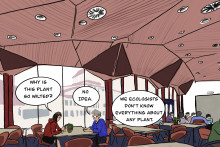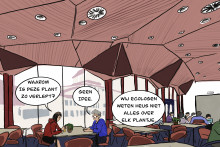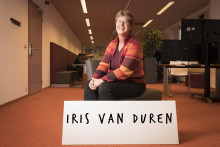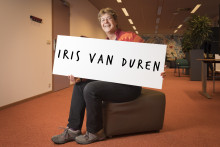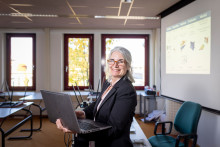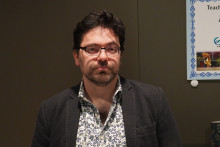'There are roughly two types of scientists: you have people who know a lot about a small part and you have people who have an overview of everything.' Iris van Duren, assistant professor and ecologist, belongs to the latter group. Instead of monomaniacally focusing on a small area, she prefers to regularly explore unknown territory. She calls this 'constantly zooming in and out'.
Her specialisation is 'remote sensing', the use of satellite data in the field of sustainability. She applies this to research into biodiversity and the sustainable production of bio-energy, but she can also talk about the distribution of elephants in Liberia and the main food crops of the Ruandan mountain gorilla. Currently, she spends a lot of time on a project concerning sustainable shrimp farming in Vietnam. The cultivation goes hand in hand with the restoration of mangrove forests at the same location. 'I don't know anything about shrimp, I don't even like them,' she says, laughing, 'but I do know how to map mangrove forests. So we work with people who know a lot about shrimp farming, and that's when I see how I can bring in my own expertise.'

The stereotypical image of an ecologist is someone who happily roams the fields with a net and a magnifying glass. That image is very limited, Van Duren explains. 'Ecologists are particularly good at making connections between all kinds of parts of an ecosystem. So you understand how systems interlock, how substances are broken down, which organisms are needed to make all those processes interlock - the water cycle, the carbon cycle, the nutrient cycle. That is not to say that I understand everything about every ecosystem. It is not the case that if they park me in Ghana I immediately know all the species and which insects do what, it doesn't work that way.'
Her field is changing rapidly under the influence of technological developments. With the growing amount of data and possibilities to analyse it, Van Duren sees more and more 'button-pushers'. 'They bring in very large data sets and draw all sorts of connections. I see a lot of studies where everything is mapped and analysed, you find a relationship between A and B, but what that means and how it works is not explained very well.' To understand that it is normal for leaves to fall in September, for example, you need to know about seasonal changes. She therefore teaches her students that a thorough knowledge of systems is very important when making analyses.
Of all her tasks, teaching is the one that is closest to her heart. Some of her colleagues, on the other hand, prefer to do only research. Van Duren thinks it's a shame that the university allows so little specialisation. 'If you force people to write two publications a year, plus teach, plus run projects, then you get everything at an average level. If you build teams in which someone with a passion for research works together with someone who enjoys teaching, then I think you can increase the quality of your work without having to put in a lot of effort. In that sense, the settlement model within the academic world is somewhat counterproductive. You breed grey mice, instead of using people where their talent really lies.'



